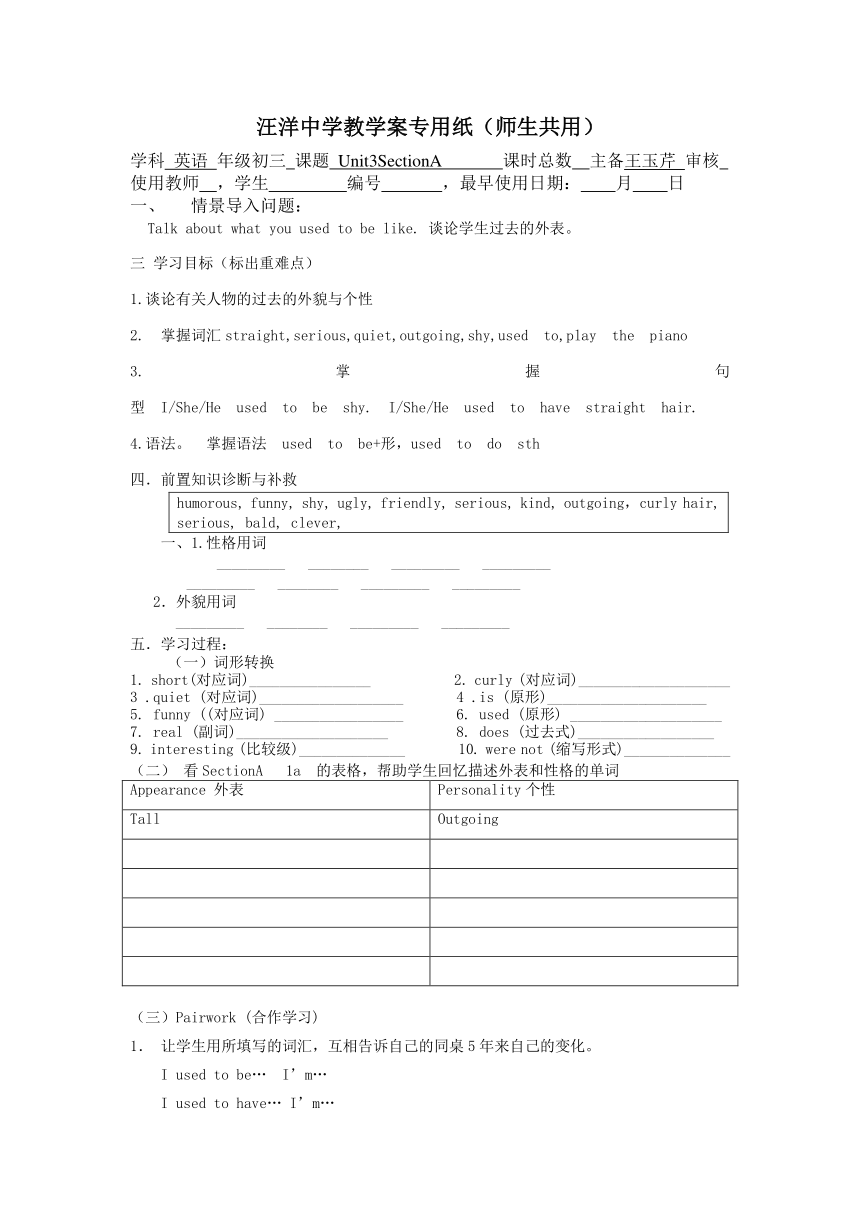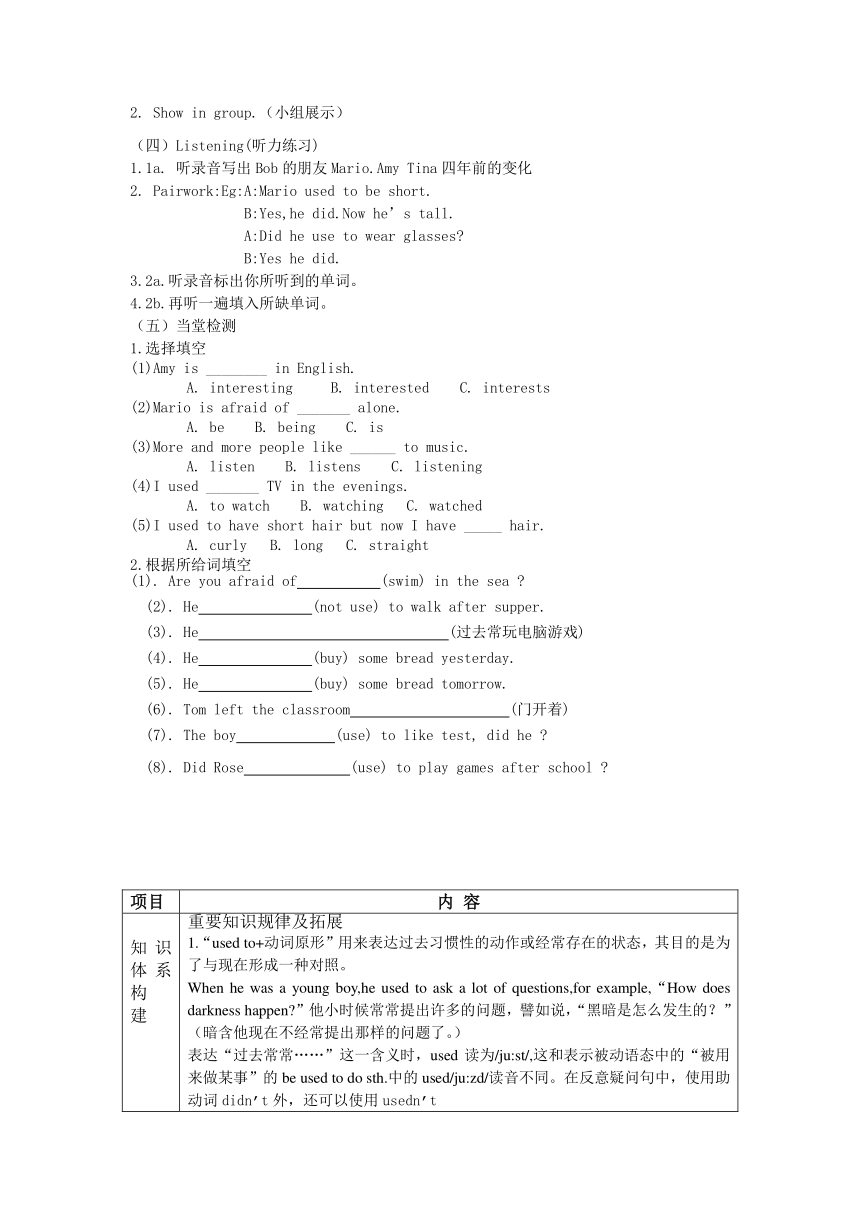Unit 3 I used to be afraid of the dark。>Section A 学案
文档属性
| 名称 | Unit 3 I used to be afraid of the dark。>Section A 学案 |

|
|
| 格式 | zip | ||
| 文件大小 | 17.3KB | ||
| 资源类型 | 教案 | ||
| 版本资源 | 鲁教版(五四学制) | ||
| 科目 | 英语 | ||
| 更新时间 | 2013-05-07 00:00:00 | ||
图片预览


文档简介
汪洋中学教学案专用纸(师生共用)
学科 英语 年级初三 课题 Unit3SectionA 课时总数 主备王玉芹 审核
使用教师 ,学生 编号 ,最早使用日期: 月 日
情景导入问题:
Talk about what you used to be like. 谈论学生过去的外表。
三 学习目标(标出重难点)
1.谈论有关人物的过去的外貌与个性
2. 掌握词汇straight,serious,quiet,outgoing,shy,used to,play the piano
3. 掌握句型 I/She/He used to be shy. I/She/He used to have straight hair.
4.语法。 掌握语法 used to be+形,used to do sth
四.前置知识诊断与补救
humorous, funny, shy, ugly, friendly, serious, kind, outgoing,curly hair, serious, bald, clever,
一、1.性格用词
_________ ________ _________ _________
_________ ________ _________ _________
2.外貌用词
_________ ________ _________ _________
五.学习过程:
(一)词形转换
1. short(对应词)________________ 2. curly (对应词)____________________
3 .quiet (对应词)___________________ 4 .is (原形)_____________________
5. funny ((对应词) _________________ 6. used (原形) ____________________
7. real (副词)____________________ 8. does (过去式)__________________
9. interesting (比较级)______________ 10. were not (缩写形式)______________
(二) 看SectionA 1a 的表格,帮助学生回忆描述外表和性格的单词
Appearance 外表 Personality个性
Tall Outgoing
(三)Pairwork (合作学习)
1. 让学生用所填写的词汇,互相告诉自己的同桌5年来自己的变化。
I used to be… I’m…
I used to have… I’m…
2. Show in group.(小组展示)
(四)Listening(听力练习)
1.1a. 听录音写出Bob的朋友Mario.Amy Tina四年前的变化
2. Pairwork:Eg:A:Mario used to be short.
B:Yes,he did.Now he’s tall.
A:Did he use to wear glasses
B:Yes he did.
3.2a.听录音标出你所听到的单词。
4.2b.再听一遍填入所缺单词。
(五)当堂检测
1.选择填空
(1)Amy is ________ in English.
A. interesting B. interested C. interests
(2)Mario is afraid of _______ alone.
A. be B. being C. is
(3)More and more people like ______ to music.
A. listen B. listens C. listening
(4)I used _______ TV in the evenings.
A. to watch B. watching C. watched
(5)I used to have short hair but now I have _____ hair.
A. curly B. long C. straight
2.根据所给词填空
(1). Are you afraid of (swim) in the sea
(2). He (not use) to walk after supper.
(3). He (过去常玩电脑游戏)
(4). He (buy) some bread yesterday.
(5). He (buy) some bread tomorrow.
(6). Tom left the classroom (门开着)
(7). The boy (use) to like test, did he
(8). Did Rose (use) to play games after school
项目 内 容
知识体系构 建生活课堂渗 透 重要知识规律及拓展1.“used to+动词原形”用来表达过去习惯性的动作或经常存在的状态,其目的是为了与现在形成一种对照。When he was a young boy,he used to ask a lot of questions,for example,“How does darkness happen ”他小时候常常提出许多的问题,譬如说,“黑暗是怎么发生的?”(暗含他现在不经常提出那样的问题了。)表达“过去常常……”这一含义时,used读为/ju:st/,这和表示被动语态中的“被用来做某事”的be used to do sth.中的used/ju:zd/读音不同。在反意疑问句中,使用助动词didn’t外,还可以使用usedn’t2、 ①一般疑问句形式:Did you use to be shor No, I didn’t. (ask and answer)师生互问互答。 Yes, I did. ②反意疑问句:You used to be short, didn’t you? No, I didn’t. I go to sleep with my bedroom light on. with 表伴随状态 eg My grandma was sitting in the room with the window open. 3. I play soccer and I’m on the swim team①.我踢足球并且是游泳队员。 People sure② change.人一定是要变的。on the team同in the team通常可以替换,表示“在……队;在……组”。sure在此处被用作副词,修饰动词。它常常在非正式语体中替代surely。现代英语习惯将used to当成实义动词,因此多使用did/didn’t助动词构成疑问句和否定句。4、alone表示“单独在一起,独自一人”,而lonely表达“内心孤独”。5、afraid与terrified都可以表示“害怕的”,但是它们还有不同之处:afraid不能作定语(但是terrified可以作定语),它多用于习惯经常地“惧怕”某事物,泛指一种“恐惧心理”。I’m afraid of a dog.我怕狗。terrified指感受到“很强烈的、突如其来的恐惧”。The terrified children ran home.受惊吓的孩子跑回家
展示过程设 计教学问题反 思 Step1Ⅰ. learning AimsⅡ. learning Key Points
1. Key Vocabulary
used to…
2. Target Language
Did you use to watch movies
Yes, I did.Used to +do
Ⅲ. learning Difficult Points
1. used to do…..
2. Did you use to ……Step2Revision
Check homework. Invite different students to report their discovery of new ways of studying that haven’t been introduced in the book or in class.
S1: My friend Peter likes to listen to music while he studies.
S2: My father used to go to the library where it was very quiet.
S3…Step 32a
This activity provides listening practice using the target language.
Call students’ attention to the picture StepⅢ 2b
This activity provides listening practice using the target language.
Point to the list of answers in the box.
Get different students to read the answers to the class.
Point to the checked questions in Activity 2a..Step 4 2c
This activity provides oral practice using the target language. Invite a pair of
students to read the sample conversation to the class.
SA: Have you ever studied with a group
SB: Yes, I have. I’ve learned a lot that way.
Write the sample conversation on the blackboard.
学科 英语 年级初三 课题 Unit3SectionA 课时总数 主备王玉芹 审核
使用教师 ,学生 编号 ,最早使用日期: 月 日
情景导入问题:
Talk about what you used to be like. 谈论学生过去的外表。
三 学习目标(标出重难点)
1.谈论有关人物的过去的外貌与个性
2. 掌握词汇straight,serious,quiet,outgoing,shy,used to,play the piano
3. 掌握句型 I/She/He used to be shy. I/She/He used to have straight hair.
4.语法。 掌握语法 used to be+形,used to do sth
四.前置知识诊断与补救
humorous, funny, shy, ugly, friendly, serious, kind, outgoing,curly hair, serious, bald, clever,
一、1.性格用词
_________ ________ _________ _________
_________ ________ _________ _________
2.外貌用词
_________ ________ _________ _________
五.学习过程:
(一)词形转换
1. short(对应词)________________ 2. curly (对应词)____________________
3 .quiet (对应词)___________________ 4 .is (原形)_____________________
5. funny ((对应词) _________________ 6. used (原形) ____________________
7. real (副词)____________________ 8. does (过去式)__________________
9. interesting (比较级)______________ 10. were not (缩写形式)______________
(二) 看SectionA 1a 的表格,帮助学生回忆描述外表和性格的单词
Appearance 外表 Personality个性
Tall Outgoing
(三)Pairwork (合作学习)
1. 让学生用所填写的词汇,互相告诉自己的同桌5年来自己的变化。
I used to be… I’m…
I used to have… I’m…
2. Show in group.(小组展示)
(四)Listening(听力练习)
1.1a. 听录音写出Bob的朋友Mario.Amy Tina四年前的变化
2. Pairwork:Eg:A:Mario used to be short.
B:Yes,he did.Now he’s tall.
A:Did he use to wear glasses
B:Yes he did.
3.2a.听录音标出你所听到的单词。
4.2b.再听一遍填入所缺单词。
(五)当堂检测
1.选择填空
(1)Amy is ________ in English.
A. interesting B. interested C. interests
(2)Mario is afraid of _______ alone.
A. be B. being C. is
(3)More and more people like ______ to music.
A. listen B. listens C. listening
(4)I used _______ TV in the evenings.
A. to watch B. watching C. watched
(5)I used to have short hair but now I have _____ hair.
A. curly B. long C. straight
2.根据所给词填空
(1). Are you afraid of (swim) in the sea
(2). He (not use) to walk after supper.
(3). He (过去常玩电脑游戏)
(4). He (buy) some bread yesterday.
(5). He (buy) some bread tomorrow.
(6). Tom left the classroom (门开着)
(7). The boy (use) to like test, did he
(8). Did Rose (use) to play games after school
项目 内 容
知识体系构 建生活课堂渗 透 重要知识规律及拓展1.“used to+动词原形”用来表达过去习惯性的动作或经常存在的状态,其目的是为了与现在形成一种对照。When he was a young boy,he used to ask a lot of questions,for example,“How does darkness happen ”他小时候常常提出许多的问题,譬如说,“黑暗是怎么发生的?”(暗含他现在不经常提出那样的问题了。)表达“过去常常……”这一含义时,used读为/ju:st/,这和表示被动语态中的“被用来做某事”的be used to do sth.中的used/ju:zd/读音不同。在反意疑问句中,使用助动词didn’t外,还可以使用usedn’t2、 ①一般疑问句形式:Did you use to be shor No, I didn’t. (ask and answer)师生互问互答。 Yes, I did. ②反意疑问句:You used to be short, didn’t you? No, I didn’t. I go to sleep with my bedroom light on. with 表伴随状态 eg My grandma was sitting in the room with the window open. 3. I play soccer and I’m on the swim team①.我踢足球并且是游泳队员。 People sure② change.人一定是要变的。on the team同in the team通常可以替换,表示“在……队;在……组”。sure在此处被用作副词,修饰动词。它常常在非正式语体中替代surely。现代英语习惯将used to当成实义动词,因此多使用did/didn’t助动词构成疑问句和否定句。4、alone表示“单独在一起,独自一人”,而lonely表达“内心孤独”。5、afraid与terrified都可以表示“害怕的”,但是它们还有不同之处:afraid不能作定语(但是terrified可以作定语),它多用于习惯经常地“惧怕”某事物,泛指一种“恐惧心理”。I’m afraid of a dog.我怕狗。terrified指感受到“很强烈的、突如其来的恐惧”。The terrified children ran home.受惊吓的孩子跑回家
展示过程设 计教学问题反 思 Step1Ⅰ. learning AimsⅡ. learning Key Points
1. Key Vocabulary
used to…
2. Target Language
Did you use to watch movies
Yes, I did.Used to +do
Ⅲ. learning Difficult Points
1. used to do…..
2. Did you use to ……Step2Revision
Check homework. Invite different students to report their discovery of new ways of studying that haven’t been introduced in the book or in class.
S1: My friend Peter likes to listen to music while he studies.
S2: My father used to go to the library where it was very quiet.
S3…Step 32a
This activity provides listening practice using the target language.
Call students’ attention to the picture StepⅢ 2b
This activity provides listening practice using the target language.
Point to the list of answers in the box.
Get different students to read the answers to the class.
Point to the checked questions in Activity 2a..Step 4 2c
This activity provides oral practice using the target language. Invite a pair of
students to read the sample conversation to the class.
SA: Have you ever studied with a group
SB: Yes, I have. I’ve learned a lot that way.
Write the sample conversation on the blackboard.
同课章节目录
- Unit 1 When was heborn?
- Section A
- Section B
- Unit 2 It's a nice day, isn't it?
- Section A
- Section B
- Unit 3 Where would you like to visit?
- Section A
- Section B
- Unit 4 How can we become good learners?
- Section A
- Section B
- Unit 5 I think that mooncakes are delicious!
- Section A
- Section B
- Unit 6 Could you please tell me where the restroom
- Section A
- Section B
- Unit 7 I used to be afraid of the dark.
- Section A
- Section B
- Unit 8 What are the shirts made of?
- Section A
- Section B
